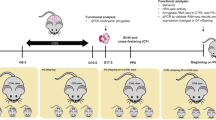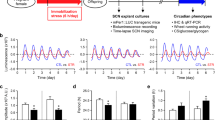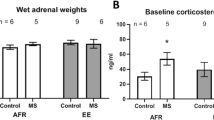Abstract
Maternal deprivation produces persistent abnormalities in behavioral and neuroendocrine functions associated with the hippocampus, a brain region that shows considerable structural change in response to experience throughout life. Here we show that adverse experience early in life affects the regulation of adult neurogenesis in the hippocampus. More specifically, a decrease in cell proliferation and immature neuron production are observed in the dentate gyrus of adult rats that are maternally separated as pups. Although maternally separated rats show normal basal levels of corticosterone, the suppression of cell proliferation in these rats can be reversed by lowering corticosterone below the control value. In addition, normal stress-induced suppression of cell proliferation and neurogenesis, despite normal activation of the hypothalamic pituitary adrenal (HPA) axis, is not observed in maternally separated rats. Our results suggest that early adverse experience inhibits structural plasticity via hypersensitivity to glucocorticoids and diminishes the ability of the hippocampus to respond to stress in adulthood.
This is a preview of subscription content, access via your institution
Access options
Subscribe to this journal
Receive 12 print issues and online access
$209.00 per year
only $17.42 per issue
Buy this article
- Purchase on Springer Link
- Instant access to full article PDF
Prices may be subject to local taxes which are calculated during checkout




Similar content being viewed by others
References
Heim, C. & Nemeroff, C.B. The role of childhood trauma in the neurobiology of mood and anxiety disorders: preclinical and clinical studies. Biol. Psychiatry 49, 1023–1039 (2001).
Sanchez, M.M., Ladd, C.O. & Plotsky, P.M. Early adverse experience as a developmental risk factor for later psychopathology: evidence from rodent and primate models. Dev. Psychopathol. 13, 419–449 (2001).
Newport, D.J., Stowe, Z.N. & Nemeroff, C.B. Parental depression: animal models of an adverse life event. Am. J. Psychiatry 159, 1265–1283 (2002).
Levine, S. Influence of psychological variables on the activity of the hypothalamic-pituitary-adrenal axis. Eur. J. Pharmacol. 405, 149–160 (2000).
Huot, R.L., Plotsky, P.M., Lenox, R.H. & McNamara, R.K. Neonatal maternal separation reduces hippocampal mossy fiber density in adult Long Evans rats. Brain Res. 950, 52–63 (2002).
Sapolsky, R.M. & Meaney, M.J. Maturation of the adrenocortical stress response: neuroendocrine control mechanisms and the stress hyporesponsive period. Brain Res. 396, 64–76 (1986).
Plotsky, P.M. & Meaney, M.J. Early, postnatal experience alters hypothalamic corticotropin-releasing factor (CRF) mRNA, median eminence CRF content and stress-induced release in adult rats. Brain Res. Mol. Brain Res. 18, 195–200 (1993).
Liu, D., Caldji, C., Sharma, S., Plotsky, P.M. & Meaney, M.J. Influence of neonatal rearing conditions on stress-induced adrenocorticotropin responses and norepinephrine release in the hypothalamic paraventricular nucleus. J. Neuroendocrinol. 12, 5–12 (2000).
Meaney, M.J., Aitken, D.H., Viau, V., Sharma, S. & Sarrieau, A. Neonatal handling alters adrenocortical negative feedback sensitivity and hippocampal type II glucocorticoid receptor binding in the rat. Neuroendocrinology 50, 597–604 (1989).
Viau, V., Sharma, S., Plotsky, P.M. & Meaney, M.J. Increased plasma ACTH responses to stress in nonhandled compared with handled rats require basal levels of corticosterone and are associated with increased levels of ACTH secretagogues in the median eminence. J. Neurosci. 13, 1097–1105 (1993).
Huot, R.L., Thrivikraman, K.V., Meaney, M.J. & Plotsky, P.M. Development of adult ethanol preference and anxiety as a consequence of neonatal maternal separation in Long Evans rats and reversal with antidepressant treatment. Psychopharmacology 158, 366–373 (2001).
Lovic, V., Gonzalez, A. & Fleming, A.S. Maternally separated rats show deficits in maternal care in adulthood. Dev. Psychobiol. 39, 19–33 (2001).
Magarinos, A.M., Somoza, G. & De Nicola, A.F. Glucocorticoid negative feedback and glucocorticoid receptors after hippocampectomy in rats. Horm. Metab. Res. 19, 105–109 (1987).
Sapolsky, R.M., Armanini, M.P., Sutton, S.W. & Plotsky, P.M. Elevation of hypophysial portal concentrations of adrenocorticotropin secretagogues after fornix transection. Endocrinology 125, 2881–2887 (1989).
Herman, J.P., Cullinan, W.E., Morano, M.I., Akil, H. & Watson, S.J. Contribution of the ventral subiculum to inhibitory regulation of the hypothalamo-pituitary-adrenocortical axis. J. Neuroendocrinol. 7, 475–482 (1995).
Deacon, R.M., Bannerman, D.M. & Rawlins, J.N. Anxiolytic effects of cytotoxic hippocampal lesions in rats. Behav. Neurosci. 116, 494–497 (2002).
Bannerman, D.M. et al. Double dissociation of function within the hippocampus: spatial memory and hyponeophagia. Behav. Neurosci. 116, 884–901 (2003).
Riedel, G. et al. Reversible neural inactivation reveals hippocampal participation in several memory processes. Nat. Neurosci. 2, 898–905 (1999).
Gould, E. & Gross, C.G. Neurogenesis in adult mammals: some progress and problems. J. Neurosci. 22, 619–623 (2002).
Cameron, H.A. & McKay, R.D. Adult neurogenesis produces a large pool of new granule cells in the dentate gyrus. J. Comp. Neurol. 435, 406–417 (2001).
Cameron, H.A. & Gould, E. Adult neurogenesis is regulated by adrenal steroids in the dentate gyrus. Neuroscience. 61, 203–209 (1994).
Gould, E., Cameron, H.A., Daniels, D.C., Woolley, C.S. & McEwen, B.S. Adrenal hormones suppress cell division in the adult rat dentate gyrus. J. Neurosci. 12, 3642–2650 (1992).
Tanapat, P., Hastings, N.B., Rydel, T.A., Galea, L.A. & Gould, E. Exposure to fox odor inhibits cell proliferation in the hippocampus of adult rats via an adrenal hormone-dependent mechanism. J. Comp. Neurol. 437, 496–504 (2001).
Gould, E., McEwen, B.S., Tanapat, P., Galea, L.A. & Fuchs, E. Neurogenesis in the dentate gyrus of the adult tree shrew is regulated by psychosocial stress and NMDA receptor activation. J. Neurosci. 17, 2492–2498 (1997).
Gould, E., Tanapat, P., McEwen, B.S., Flugge, G. & Fuchs, E. Proliferation of granule cell precursors in the dentate gyrus of adult monkeys is diminished by stress. Proc. Natl. Acad. Sci. USA 95, 3168–3171 (1998).
Malberg, J.E. & Duman, R.S. Cell proliferation in adult hippocampus is decreased by inescapable stress: reversal by fluoxetine treatment. Neuropsychopharmacology 28, 1562–1571 (2003).
Viau, V., Sharma, S. & Meaney, M.J. Changes in plasma adrenocorticotropin, corticosterone, corticosteroid-binding globulin, and hippocampal glucocorticoid receptor occupancy/translocation in rat pups in response to stress. J. Neuroendocrinol. 8, 1–8 (1996).
Hastings, N.B. & Gould, E. Rapid extension of axons into the CA3 region by adult-generated granule cells. J. Comp. Neurol. 413, 146–154 (1999).
Snyder, J.S., Kee, N. & Wojtowicz, J.M. Effects of adult neurogenesis on synaptic plasticity in the rat dentate gyrus. J. Neurophysiol. 85, 2423–2431 (2001).
Wang, S., Scott, B.W. & Wojtowicz, J.M. Heterogenous properties of dentate granule neurons in the adult rat. J. Neurobiol. 42, 248–257 (2000).
Schmidt-Hieber, C., Jonas, P. & Bischofberger, J. Enhanced synaptic plasticity in newly generated granule cells of the adult hippocampus. Nature 429, 184–187 (2004).
Santarelli, L. et al. Requirement of hippocampal neurogenesis for the behavioral effects of antidepressants. Science 301, 805–809 (2003).
Gould, E., Beylin, A., Tanapat, P., Reeves, A. & Shors, T.J. Learning enhances adult neurogenesis in the hippocampal formation. Nat. Neurosci. 2, 260–265 (1999).
Dobrossy, M.D. et al. Differential effects of learning on neurogenesis: learning increases or decreases the number of newly born cells depending on their birth date. Mol. Psychiatry 8, 974–982 (2003).
Shors, T.J., Townsend, D.A., Zhao, M., Kozorovitskiy, Y. & Gould, E. Neurogenesis may relate to some but not all types of hippocampal-dependent learning. Hippocampus 12, 578–584 (2002).
Madsen, T.M., Kristjansen, P.E., Bolwig, T.G. & Wortwein, G. Arrested neuronal proliferation and impaired hippocampal function following fractionated brain irradiation in the adult rat. Neuroscience 119, 635–642 (2003).
Sheline, Y.I. Hippocampal atrophy in major depression: a result of depression-induced neurotoxicity? Mol. Psychiatry 1, 298–299 (1996).
Sheline, Y.I., Sanghavi, M., Mintun, M.A. & Gado, M.H. Depression duration but not age predicts hippocampal volume loss in medically healthy women with recurrent major depression. J. Neurosci. 19, 5034–5043 (1999).
Bremner, J.D. et al. Hippocampal volume reduction in major depression. Am. J. Psychiatry 158, 652–653 (2000).
Stein, M.B., Koverola, C., Hanna, C., Torchia, M.G. & McClarty, B. Hippocampal volume in women victimized by childhood sexual abuse. Psychol. Med. 27, 951–959 (1997).
Vythilingam, M. et al. Childhood trauma associated with smaller hippocampal volume in women with major depression. Am. J. Psychiatry 159, 2072–2080 (2002).
Jans, J.E. & Woodside, B.C. Nest temperature: effects on maternal behavior, pup development, and interactions with handling. Dev. Psychobiol. 23, 519–534 (1990).
Gould, E., Woolley, C.S. & McEwen, B.S. Short-term glucocorticoid manipulations affect neuronal morphology and survival in the adult dentate gyrus. Neuroscience 37, 367–375 (1990).
Vernet-Maury, E., Polak, E.H. & Demael, A. Structure-activity relationship of stress-inducing odorants in the rat. J. Chem. Ecol. 10, 1007–1019 (1984).
Acknowledgements
We thank to D.L. Samburg, N.B. Hastings, P. Tanapat and Y. Kozorovitskiy for help with this manuscript. This work was supported by funding from the NIH (grant MH59740) and the Conte Center for the Neuroscience of Mental Disorders (MH58922).
Author information
Authors and Affiliations
Corresponding author
Ethics declarations
Competing interests
The authors declare no competing financial interests.
Rights and permissions
About this article
Cite this article
Mirescu, C., Peters, J. & Gould, E. Early life experience alters response of adult neurogenesis to stress. Nat Neurosci 7, 841–846 (2004). https://doi.org/10.1038/nn1290
Received:
Accepted:
Published:
Issue Date:
DOI: https://doi.org/10.1038/nn1290
This article is cited by
-
Effect of a multi-strain probiotic mixture consumption on anxiety and depression symptoms induced in adult mice by postnatal maternal separation
Microbiome (2024)
-
Early life adversity as a risk factor for cognitive impairment and Alzheimer’s disease
Translational Neurodegeneration (2023)
-
Effects of the Maternal Environment on Early Postnatal Development in OXYS Rats
Neuroscience and Behavioral Physiology (2023)
-
Early life adversity shapes neural circuit function during sensitive postnatal developmental periods
Translational Psychiatry (2022)
-
Effects of neonatal rearing by different types of foster mother on the distribution of corticotropin-releasing factor neurons in the central amygdaloid nucleus in rats
Experimental Brain Research (2022)



